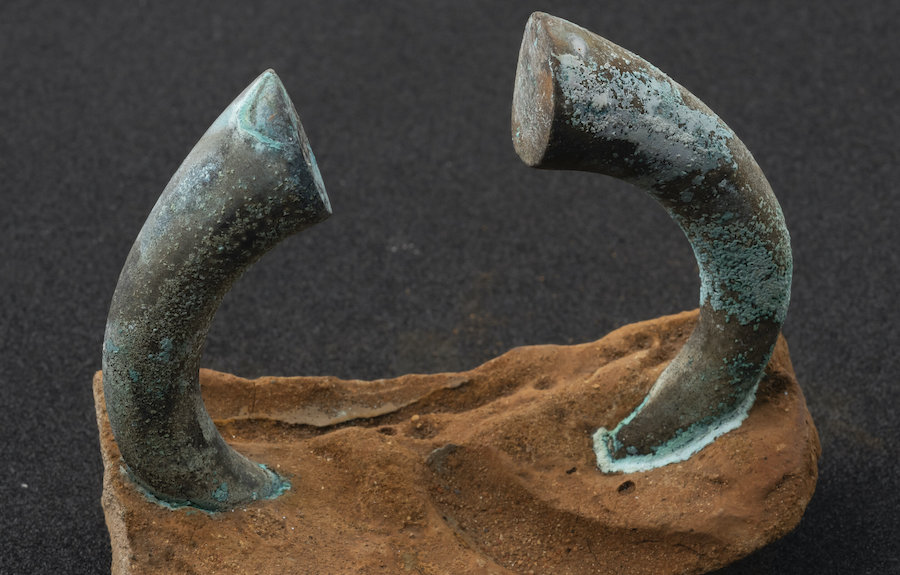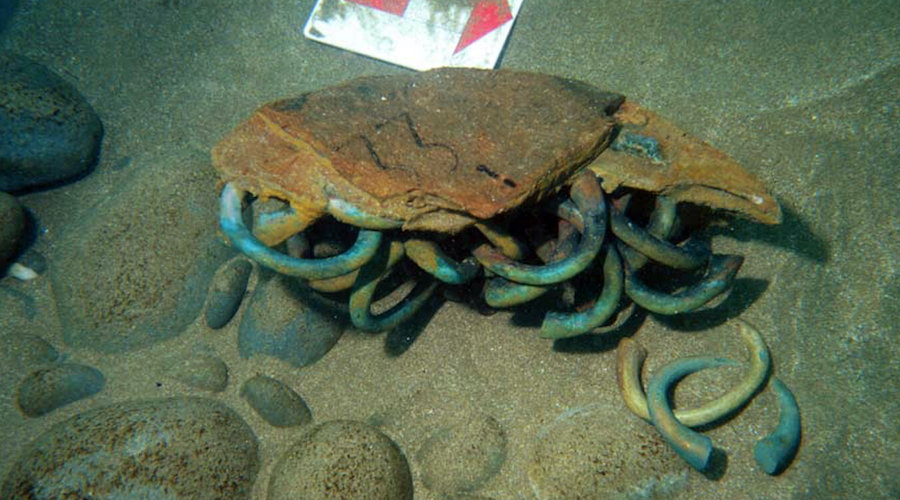Staff Writer | April 9, 2023

Detail of a manilla bracelet concreted to part of a pot from a Flemish trader excavated by the Sociedad de Ciencias Aranzadi off Getaria, Basque Country, northern Spain. (Image by Ana Maria Benito-Dominguez, Public Library of Science CC-BY 4.0).
Researchers at Germany’s Technische Hochschule Georg Agricola recently discovered that the renowned Benin Bronzes are composed of metal sourced from Germany.

In a paper published in the journal Plos One, the scholars explain that the Benin Bronzes collectively refers to thousands of African artworks in the form of heads, plaques, figurines, and other objects produced by the Edo people of Nigeria between the 16th and 19th century AD. It is commonly thought that the metal in these sculptures was sourced from small brass rings called “manillas” which were used as currency in European trade in West Africa, but this has been difficult to confirm.
The artifacts have also been the subject of controversy in light of the ongoing repatriation discussions between Nigerian officials and many museums holding the Benin Bronzes.

Some of the 313 manillas excavated by the Sociedad de Ciencias Aranzadi from a Flemish trader lost in 1524 off Getaria in Basque Country, northern Spain. (Image by Ana Maria Benito-Dominguez, Public Library of Science CC-BY 4.0).
For this study, the researchers performed chemical analyses on 67 manillas recovered from five Atlantic shipwrecks and three land sites in Europe and Africa dating between the 16th and 19th centuries. Specifically, they wanted to identify lead isotope signatures and trace element compositions of the metal.
The group found a strong similarity between the metal composition of the Benin Bronzes and that of the manillas used in Portuguese trade prior to the 18th century, suggesting these manillas were a major source of metal for the sculptures.
Furthermore, the composition of those manillas is similar to ores from the German Rhineland, suggesting that Germany was the main source of metal for the production of pre-18th century manillas and, ultimately, the Benin Bronzes. The consistency in the metal composition of the Bronzes suggests that African metalsmiths were very selective about what metal they would use.
“The Benin Bronzes are the most famous ancient works of art in all of West Africa. Where their brass came from has long been a mystery. Finally, we can prove the totally unexpected: the brass used for the Benin masterpieces, long thought to come from Britain or Flanders, was mined in western Germany,” Tobias Skowronek, lead author of the paper, said in a media statement. “The Rhineland manillas were then shipped more than 6,300 kilometres to Benin. This is the first time a scientific link has been made.”
Skowronek noted that analyses of other German-produced metal wares from this time might shed further light on the details of early Atlantic trade. He also said that Portuguese manillas were likely not the only source of metal for the Benin Bronzes, thus, there are more questions to be answered about the manufacturing of the famous sculptures.
For this study, the researchers performed chemical analyses on 67 manillas recovered from five Atlantic shipwrecks and three land sites in Europe and Africa dating between the 16th and 19th centuries. Specifically, they wanted to identify lead isotope signatures and trace element compositions of the metal.
The group found a strong similarity between the metal composition of the Benin Bronzes and that of the manillas used in Portuguese trade prior to the 18th century, suggesting these manillas were a major source of metal for the sculptures.
Furthermore, the composition of those manillas is similar to ores from the German Rhineland, suggesting that Germany was the main source of metal for the production of pre-18th century manillas and, ultimately, the Benin Bronzes. The consistency in the metal composition of the Bronzes suggests that African metalsmiths were very selective about what metal they would use.
“The Benin Bronzes are the most famous ancient works of art in all of West Africa. Where their brass came from has long been a mystery. Finally, we can prove the totally unexpected: the brass used for the Benin masterpieces, long thought to come from Britain or Flanders, was mined in western Germany,” Tobias Skowronek, lead author of the paper, said in a media statement. “The Rhineland manillas were then shipped more than 6,300 kilometres to Benin. This is the first time a scientific link has been made.”
Skowronek noted that analyses of other German-produced metal wares from this time might shed further light on the details of early Atlantic trade. He also said that Portuguese manillas were likely not the only source of metal for the Benin Bronzes, thus, there are more questions to be answered about the manufacturing of the famous sculptures.
No comments:
Post a Comment